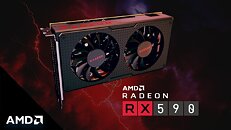- Joined
- Oct 9, 2007
- Messages
- 47,537 (7.47/day)
- Location
- Hyderabad, India
| System Name | RBMK-1000 |
|---|---|
| Processor | AMD Ryzen 7 5700G |
| Motherboard | ASUS ROG Strix B450-E Gaming |
| Cooling | DeepCool Gammax L240 V2 |
| Memory | 2x 8GB G.Skill Sniper X |
| Video Card(s) | Palit GeForce RTX 2080 SUPER GameRock |
| Storage | Western Digital Black NVMe 512GB |
| Display(s) | BenQ 1440p 60 Hz 27-inch |
| Case | Corsair Carbide 100R |
| Audio Device(s) | ASUS SupremeFX S1220A |
| Power Supply | Cooler Master MWE Gold 650W |
| Mouse | ASUS ROG Strix Impact |
| Keyboard | Gamdias Hermes E2 |
| Software | Windows 11 Pro |
AMD's ROCm compute programming platform—a competitor to NVIDIA's CUDA, dropped support for the "Polaris" graphics architecture, with the latest version 4.5 update. Users on the official ROCm git raised this as an issue assuming it was a bug, to which an official AMD support handle confirmed that the Radeon RX 480 graphics card of the original poster is no longer supported. Another user tested his "Polaris 20" based RX 570, and it isn't supported, either. It's conceivable that the "Polaris 30" based RX 590, a GPU launched in November 2018, isn't supported either. Cutting out a 3-year old graphics architecture from the compute platform sends the wrong message, especially to CUDA users who AMD wants to win over with ROCm. With contemporary GPUs priced out of reach, IT students are left with used older-generation graphics cards, such as those based on "Polaris." NVIDIA CUDA supports GPUs as far back as "Maxwell" (September 2014).

View at TechPowerUp Main Site

View at TechPowerUp Main Site






